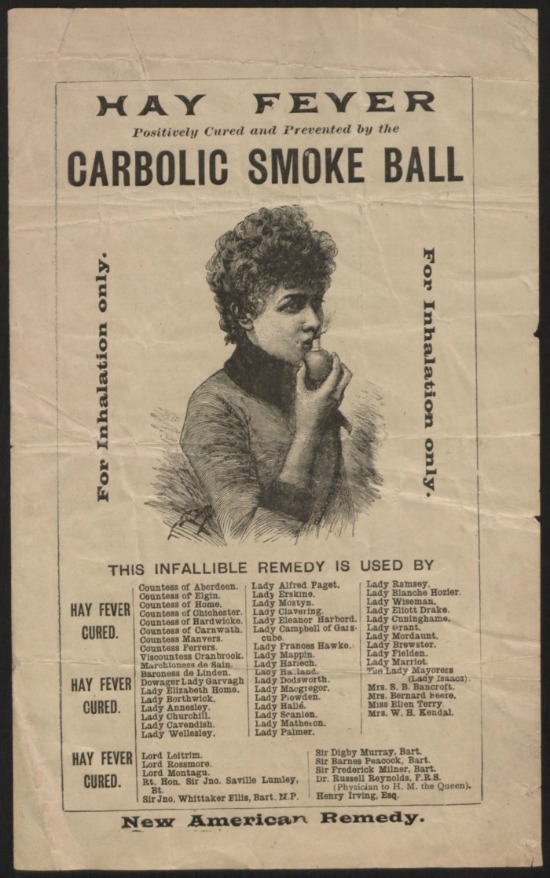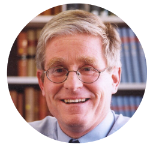 This is the third in a series of in-depth interviews with our esteemed legal leaders; our legal luminaries. Professor Mark Henaghan looks back over his life in the law, speaking candidly about his achievements, offering advice for younger lawyers and discusses what he thinks are the most important legal issues right now.
This is the third in a series of in-depth interviews with our esteemed legal leaders; our legal luminaries. Professor Mark Henaghan looks back over his life in the law, speaking candidly about his achievements, offering advice for younger lawyers and discusses what he thinks are the most important legal issues right now.
About The Legal Luminaries Project
In any sphere of human endeavour there are people whose sustained, consistent, and informed contribution within their specialist field of knowledge forms the foundation for those following in their footsteps. They are luminaries. The debt we owe them is incalculable as it is their work literally lighting our way forward.
The Legal Luminaries Project acknowledges the legacies of our esteemed legal leaders and seeks to give an overview of, and insight into, their lives within their specialist fields; to shine a light on the core values, thinking and events underpinning their successes.
Methodology
The information in each profile was collected over a series of interviews. The subjects covered and/or the questions asked appear ahead of their answers. Each of those is prefaced in bold with the interviewee’s name: e.g. Mark.
Professor Mark Henaghan
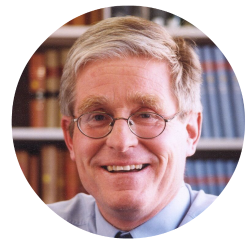 A brief background
A brief background
Mark Henaghan is the Dean of the Faculty of Law of the University of Otago in Dunedin, New Zealand. While his research interests include family law, especially law relating to children, law regarding the human genome, and judiciary law, the principal focus of his career is teaching.
Mark studied law at Otago University and on qualifying he became a teaching fellow, providing advice, helping with submissions, and training Family Court judges. He is involved in the Pathways and Transitions Research Project as part of the New Zealand Government funded Resilience Research Project.
Awards
 Mark is the second academic to be admitted as an Associate Fellow of the International Academy of Family Lawyers (IAFL). The Academy is a worldwide association of practising lawyers who have been recognised by their peers as being among the most experienced and skilled family law specialists in their respective countries.
Mark is the second academic to be admitted as an Associate Fellow of the International Academy of Family Lawyers (IAFL). The Academy is a worldwide association of practising lawyers who have been recognised by their peers as being among the most experienced and skilled family law specialists in their respective countries.
Contribution to law
– If you viewed your career in the law as an outsider, what would you say your main contribution or legacy was?
Mark:
I think my contribution is split four ways between:
1. Teaching
A good teacher can set up a student through letting them know what is possible, and what they’re capable of.
I am passionate about teaching! I believe the world needs ethical, principled lawyers more than ever. They add so much to society. As a teacher I see my role is to encourage that. We know teachers influence, and to get the best from others, our students, one must be the best we can be ourselves! It’s a wonderful self-fulfilling prophecy – one of ongoing mutual positive reinforcement.
Needless to say, I’ve found teaching immensely rewarding and enriching. It is such a pleasure to receive emails or letters from past students acknowledging what was given them, and letting me know what they are up to now.
We know a person’s ability to learn is influenced by their teachers. A good teacher can set up a student through letting them know what is possible, and what they’re capable of. Some people need that. A lot are not self-initiaters or self-directed. They tend to rely on others to let them know what they are capable of, and if we, as teachers, can extend their vision of themselves to something bigger and more fulfilling, then that’s a truly wonderful service.
Being a teacher teaches the person teaching as well as the student. Over the years I’ve learned never to take things for granted, never to make assumptions and, that I need to keep my mind open and that I have learnt a great deal from my students – more than they have learnt from me!
2. Family law
My primary research area is family law. I’ve always striven to clarify matters – to make it workable and practical for lawyers and judges both here and overseas. I believe we have the best family law system in the world. We need to respect, nurture and cherish it!
3. Consultation
I really enjoy liaising between people who need advice and practitioners. I am able to act as a sounding board for those who live in the “real” world and are often puzzled and flummoxed by the law. I can offer advice and weigh the impact of proposed courses of action because I know what works and what doesn’t.
4. Media spokesperson/facilitator
I often step into the role of interpreter for the media as I am able to provide context, comment , and explain legal events or actions in terms that are easily understood. It’s a much needed role for many reasons. Two of the most common are that legal actions are often misunderstood by the general populace, and the law itself is such an easy target.
Early years
Mark:
Schooling and Catholicism
I went to a Catholic school in Timaru and loved it. The priests and nuns inspired me. I remember being free to ask all sorts of questions – lots of them about everything including religious dogma. I was perplexed in particular by the statement that “the one true church was the Catholic church”. That was a major puzzle to me. How could it possibly be true? There was no wriggle room because the statement was absolute. I didn’t like that at all.
However that conundrum was offset by some marvelous stories like for instance the one in the Gospel of John (chapter 8) about the woman charged with adultery whom the Pharisees brought before Jesus for judgment. Under the prevailing Mosaic (Hebrew) law the punishment was stoning. Jesus adroitly side stepped drawing condemnation on himself for not applying it by saying, “Let he that is without sin among you, let him cast the first stone at her.” That story thrilled me.

The unease between what I was being asked to believe and my admiration for the men women who taught me finally forced me to talk about being Catholic. I remember commenting that I didn’t think I was much of one. I was very fortunate because I got a very wise answer. I was told that I was nevertheless religious because I was striving to live consciously.
I was similarly inspired by the dissidents – the radical Sisters of Mercy nuns, (Helen Goggin, Teresa O’Connor and Pauline O’Regan), who in the 1970s took off their habits and lived in the poorer suburbs of Christchurch seeking to develop and understand community and the legacy of the French worker priests.
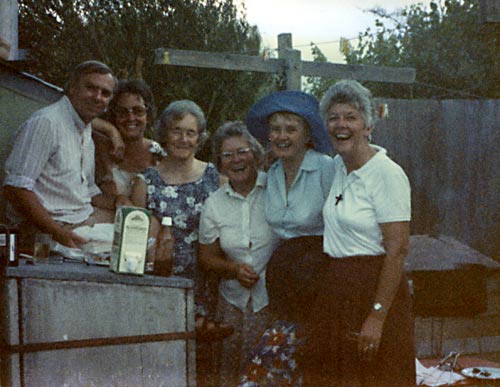
Looking back I feel very lucky. The support I got along with the smaller classes I was in meant I had numerous opportunities to explore, to talk, to debate. That gave me the confidence to become involved in everything, including drama. Speaking in public held no fears for me.
By the time I was in senior school it was suggested that I should do law. I found that because I had taken languages (Latin, French and German) I had some very useful skills to bring to my study. I was flexible because I was used to moving between languages and I had the ability to parse which meant I could isolate and decode information.
Family and community
Coming home could take two or three hours because of all the people who needed talking to along the way.
I was born in Timaru and am the eldest of three children. We were part of a close knit community and I was very social from a young age. At three I would take myself off to talk to people. I knocked on neighbour’s doors and would be brought home when I’d fallen asleep. By four I was very keen to get to school and insisted on having a school uniform which I wore everywhere. By the time I got there my already developed social trait had intensified. Coming home could take two or three hours because of all the people who needed talking to along the way.
Through high school that passion was extended to rigorous debate. I remember arguing so vehemently with a friend while riding our bikes that I fell off!
In my final year I was elected Head Prefect by my fellow students. At our school the process of choosing prefects was mostly democratic. The staff reserved the right to vetoe choices if they were entirely unsuitable and I squeaked through. A silly teenage prank with a car had almost jeopardized my chances!
Looking back I realise how fortunate I was. I had been left with free, unstructured time and had learned to be independent and happy. I formed my own path and developed my own discipline. The girls at the school where I took Latin did have a little to do with that! They were a good influence.
University
like many other first year students, I did very little academic work in the first half of the year, putting maximum energy into intense socialising.
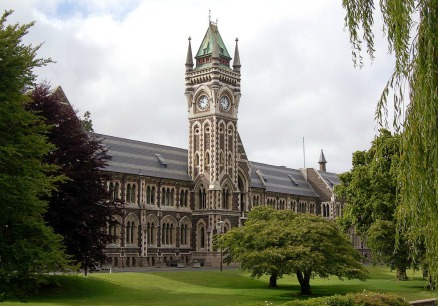
At 17 I enrolled in law, politics and history at the University of Otago.
Despite hoping to survive, like many other first year students, I did very little academic work in the first half of the year, putting maximum energy into intense socialising. If exams had been mid year I would have “died” – failed completely. In the last half I worked driven by the very real risk of public humiliation. All examination results were published in the papers in those days and they were eagerly read.
Over the holidays I worked in a variety of jobs typical for males of that time – stints at Waitaki Transport, in wool and grain sheds, at the freezing works, and as a waiter.
I met a studious Vietnamese Colombo Plan student in the library

At end of my first year my world changed when I met a studious Vietnamese Colombo Plan student in the library. This was my future wife Aimy whom I set about wooing. I remember saving to take her out to dinner. I had the huge sum of $8.00 and at the end of the evening when I had 50 cents left I realized I was a work in progress! More effort was needed. With her assistance I began to learn and appreciate the correlation between effort expended and results gained.
Under Aimy’s influence for first time I met up with other students who were engrossed in their studies. Some of those were law students who passionately explored and debated crime, tort, land law … everything they had been exposed to through their lectures. The cases were a tipping point for me. They were about real people in real situations. I decided to take law and learned to love it.
We had great lecturers like Peter Burns, Bruce Robertson, Ian Muir, John Smillie, Kevin Dawkins, Noel Carroll, Peter Sim and Bill Reid. By then I was no longer interested in shortcuts and had become a dedicated student. That led to an offer to join the honours programme which in turn led to preparing papers, dissertations, and becoming more closely involved with the faculty.
My father died suddenly in November of my final year. He was 51 years old and his passing completely disoriented me. The surety of who I was, where I was going, and what I wanted from my life fled. Seeing my indecision about what to do next Ian Muir, my honours supervisor, suggested becoming a teaching fellow in the Law Faculty. It was the best of suggestions. I feel exceedingly fortunate to have found a rich niche that has led to a full yet contemplative life. I catch up with Ian every year in London as I am most grateful to him.
The decision to take up teaching delighted my Mother who unlike my father’s family did not come from a long line of “swotty” types.
I also owe a lot to my Aunt Mary, my Dad’s older sister. She was a dedicated teacher who taught in a low decile school, the world’s worst driver and, my safety net. During the period when I was working out what to do and trying out teaching I got glandular fever. Aunt Mary took me in and made it her mission to build me up. Over the year I spent with her I got better, as well as fat.
Dad’s death and what happened afterwards taught me many things. One was that I couldn’t make it on my own. Another was that I had amazing family and community support. I remember feeling grateful, humble and fortunate. I still do.
Values
What values have you held strong throughout your career?
Mark:
I think all human beings are important regardless of their position in life, their gender, their race, their age, or any other attribute that may be used to differentiate one person from another.
The values I’ve held are very simple. I strive to bring compassion, kindness, generosity, and empathy into everything I do. Whatever the situation putting myself in the other person’s shoes helps me understand. It takes me out of myself and gives a bigger picture. That’s my ideal. I may not always achieve it. However it is what I aim for.
It’s important to me that I treat everyone respectfully, and that I take responsibility for my own behaviour, thoughts and feelings. In other words, I expect of myself that I own my own stuff and am honest about it.
I think all human beings are important regardless of their position in life, their gender, their race, their age, or any other attribute that may be used to differentiate one person from another.
Diversity is to be valued, rather than despised.
We live in a busy world, often a corporate world, and one that grows more and more hectic. Despite the temptation to see each other as functions eg. the boss, the CEO, the professor, the student, I believe that we need to see each other as people first. We need to talk to and treat each other as equals. We need to take the time to understand each other properly and to realize that everybody is directly affected by context. A behaviour always has an antecedent – no matter how strange, misplaced or bizarre it may appear to us. Diversity is to be valued, rather than despised. The search to find out what we’re all about is ongoing. Personally I think it’s an endless quest.
I find great solace and wisdom in the works of American Buddhist teacher and nun Pema Chodron. She has helped me understand many of the paradoxes central to being human. For example the way we create pressure in ourselves through not valuing or respecting ourselves properly. That leads to envy – wanting what another has, perhaps their position in life, their intelligence, their wit, their skills or their looks, and also to undermining other people.
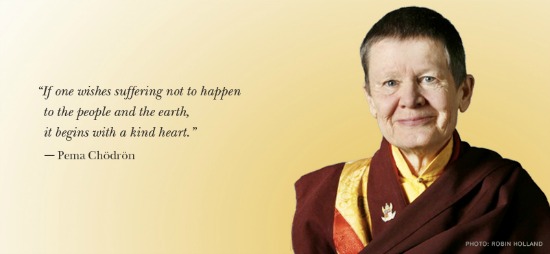
When we feel lesser, we also want others to experience that too which leads to undermining them when we get the opportunity. In New Zealand a familiar expression of that is the “clobbering machine”, a phenomena also called the “tall poppy syndrome”, whereby anybody who shines in their particular field is clobbered or cut down to become the same size as everybody else.
On the other side of not valuing ourselves is being too full of ourselves or too self important. That also creates problems. The more we become consumed with ourselves, the less room we have to see anybody else and their needs clearly. That in turn leads to thinking our needs are more urgent, more legitimate than anyone else’s. Both positions cause unhappiness. Pema Chodron teaches that we are not as important as we think we are, that the ego creates problems and that the only certainty is change.
None of us is perfect. We all stuff up!
We need to realise that everybody is interdependent, and that we all need forgiveness. None of us is perfect. We all stuff up! Everyone is human. We intend to do our best. I don’t think anybody really sets out to be the worst they can be.
Honesty demands that we acknowledge our “there for the grace of God, go I” moments.
To thrive we need to accept and respect the human condition and that’s wonderful mix of the fabulous alongside foibles. It’s an intricate and diverse dance that we all partake in and we all must find our own points of balance. Honesty demands that we acknowledge our “there for the grace of God, go I” moments. The public slips and humiliations of others can, if we let them, reveal aspects of ourselves to us. For instance Colin Craig’s defamation trial allowed us to see the tipping point where behaviour and actions were no longer reasonable.
I believe and know people thrive on kindness. The personal challenge is always asking oneself is a course of action good or bad – or appropriate. Is it fair? Whatever we do has an impact on others.
… a perfect answer suiting everybody is not possible
I also know and believe that we must hear all points of view, whether we want to or not. To be adult means we can have our own view, disagree with each other vehemently and yet still respect each other. We need to learn to accept, accommodate difference and then move on. We also need to be adult enough to realise that a perfect answer suiting everybody is not possible.
Ultimately I think hierarchy is a hindrance and that we need to challenge its formality. As Dean of the Law School I fully appreciate the irony and paradox in that! While we need to relate to each other as human to human rather than rank to rank, we also need to be awake to “sensible” contradictions enabling society and systems to function. Rank belongs in that category. If we can separate the role each of us fulfills from the value we accord ourselves and others it’s OK.
I’ve always desired an equitable society and I’ve been fortunate to have had the chance to be able to assist in bringing about change. I believe the divisions in our society are largely due to limited resources. If we look closely at the context of events, the decisions people make in their lives are largely the result of their circumstances. That can be changed and law can facilitate that process. I love that!
Have you seen changes or shifts in your values through the years?
Mark:
As I grow older the less judgmental I become. I am more open to different opinions and slower to call something either right or wrong. I realise I have more acceptance, more tolerance. I listen more, react less and am more willing to suspend my own beliefs to entertain the possibility of someone else’s.
Who has inspired and/or continues to inspire you?
Mark:
I have a collection of treasured memories . They’re enduring cameos of kindness.
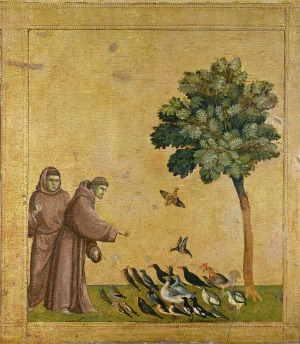
For example when Dad died, a family friend, Dorothy McKay, came to live with our family for a month. She just did it, without fanfare or large amounts of discussion. She knew my Mother needed support and shifted in. These are the acts of kindness that keep the world going round! They become treasures to value.
We need to encourage more of the same; people doing things because they are right to do.
Another example was our tea lady, Ngaire, who knew exactly what to say to cheer people up. She had no formal rank or status in our organisation but she was so kind. Her random acts of generosity, the little things she did, counted. Over time her contributions to our lives became immensely valuable. She did things without thought of future recognition for herself, or an award.
I’ve also been inspired by Martin Luther King, and words in the Prayer of St Francis Assisi are never far from my mind – “ Where there is hatred, let me sow love”
What personality or character attributes are needed to become a good lawyer?
Mark:
I believe a good lawyer needs to:
- care
- tolerate ambiguity and uncertainty
- be good at sustained , painstaking intellectual analysis and problem solving
- be able to think carefully, methodically, laterally, creatively and then draw all of that together coherently
Although the personality of a competent lawyer may vary I think they need to:
- be good at reading people and listening
- be curious; having the desire and the ability to move beyond a facade of words to get the real story
- be scruplously and rigorously honest
- be careful with promises
- be trustworthy and reliable
Because a lawyer has the potential to make a difference to our society I think they should:
- be willing to take on reform eg make submissions to parliament as these are important for the development of democracy, the bigger picture of the society we live in.
- make themselves available to voluntary organisations and law centres within their community and do pro bono work because public service is always needed.
Finally a lawyer must always remember that people are people – capable of anything and everything.
Be vigilant! Keep watching yourself. Keep renewing and rethinking to keep moving. Nothing is static. Thought that stops becomes rigid and rigidity is a hindrance. I think allowing oneself to become self satisfied is the worst thing one could do and winging anything is abhorrent.
Memories
When you look back what memories come to the fore?
Mark:
It’s always my first year law classes. I love the openness and interest of the students. They have an endearing mix of naivety, hope, freshness, and exhilaration. It’s the next generation coming through and it’s a thrill and privilege to teach them. I relish the range in those classes. They are lovely young people.
The stories I share may be old to me but they come alive in their imaginations.
The stories I share may be old to me but they come alive in their imaginations. Dr Grant’s woolly underpants seldom fails to raise a giggle. Mrs Carhill’s use of a carbolic smoke ball to circumvent the flu and May Donoghue’s misfortune in finding a snail in her ginger beer continue to delight. Their responses keep me inspired and eager to teach.
The role of thank you in my life is extraordinary. Years after I’ve taught them I meet ex-students who are now adults . They remember me , and say thank you. It’s simultaneously humbling and affirming. Becoming a lawyer can be a hard slog. There are hurdles to jump and challenges to get there. Students have to literally get on with it. I’m proud to be part of that process.
I’ve had 40 years of teaching – and I still love it. I’m still growing, trying to get better, and working it out. Being an adult and a teacher is never finished. There is no arrival!
What is your funniest memory?
Mark:
One day the door to the lecture theatre I was in flew open admitting a young man wearing nothing but a Superman cape who whizzed through the room riding a scooter.
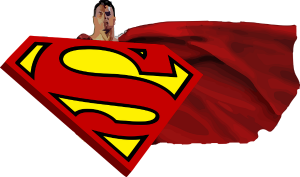 I loved the unexpectedness of it – the spontaneity! It was so funny. I remember laughing and saying “I’m glad I’m not your girlfriend!”, while glancing at his anatomy.
I loved the unexpectedness of it – the spontaneity! It was so funny. I remember laughing and saying “I’m glad I’m not your girlfriend!”, while glancing at his anatomy.
Is there a memory you are most proud of?
Mark:
I am so proud both of my children, my son and my daughter, decided to do law. It was their choice and never mentioned at home. My daughter did law and science and my son law and commerce. They are both working in very different fields of law from mine. They were in my first year class, an experience that didn’t seem to bother them at all! When they were admitted to the Bar hearing their names called out, hearing them say the oath, almost made me burst with pride. I had a tear in my eye.
What is the least known, yet formative, memory?
Mark:
I used to have a recurring nightmare brought on through the stress of one entire year’s work riding on the result of a 3 hour exam.
As a student I arrived one hour early for an exam and then panicked because no one was there and I thought I had the time wrong. That was a salutary experience – one that’s stayed with me.
I also used to have a recurring nightmare brought on through the stress of one entire year’s work riding on the result of a 3 hour exam. I would wake up thinking I had prepared for the wrong exam.
There’s a very fine line between coping and not coping.
Both those experiences, the nightmare and the panic over my exam mismanagement, has kept me very aware of the reality our first year students face. Not all of the class will be able to go on to do a law degree. I want these young people to be able to move on feeling generally OK about themselves. A door closing is not an end, but an opportunity to open another to something else. Many of them need a hand to see that. There’s a very fine line between coping and not coping. I love meeting those who did not go on to study law but who have found most worthwhile careers and who are thriving.
Is there anything else you’d like to add ?
Mark:
Another collection of memories is centred on the courts. I liked visiting them to watch lawyers at work. Wherever I was, I was keen to see what they were doing, admiring their skill and prowess.
What happens in the court room is the ultimate human drama.
I was particularly interested in criminal law and how that was played out in courts all over the globe. It was intriguing to see how they varied. It was in Britain that I realised different worlds were revealed through voice and language choices. Class distinction was alive and very well!
I found a similar set of prejudices in America. I remember visiting a court where a young mother was on trial for a drug related charge and recall my shock when I realised people had already made up their minds about her. The cynicism based on her appearance and her social position was so cruel.
I understand how important it is to retain our humanity otherwise we can make dreadful blunders in judgments.
The fact that the courts were open to the public and anyone could come along, sit and watch made them even more admirable to me. I loved the interaction ; the theatre of the process – how everyone plays their part. What happens in the court room is the ultimate human drama.
Is there an incident that led to your chosen field?
Mark:
I wanted to be a criminal lawyer until the bottom of my world fell out when my father died in the middle of my final exams in October 1977.
Everything changed – including me. I no longer knew what I wanted for myself. I was at a loose end and when Ian Muir, a friend and mentor suggested, that I apply for a position as a teaching fellow, I took his advice. To my great surprise I found I loved it! Teaching was challenging, thrilling, exciting, and fulfilling. I became a career teacher and an accidental academic. Academia was a by product, part of the position but not really my focus or passion. In fact teaching overturned my plans for a Masters. Research for me, was not so important. I realise I bucked the trend, and in doing so laid myself open for criticism and suspicion. However over time as I grew into my role, others grew used to me. We became mutually acceptable to each other! From my teaching I began to question the law which has lead to a happy and productive research career.
I am very grateful to Ian and catch up with him regularly in London.
Legacy advice
If you were able to give valuable career or personal advice to the young you – what would it be?
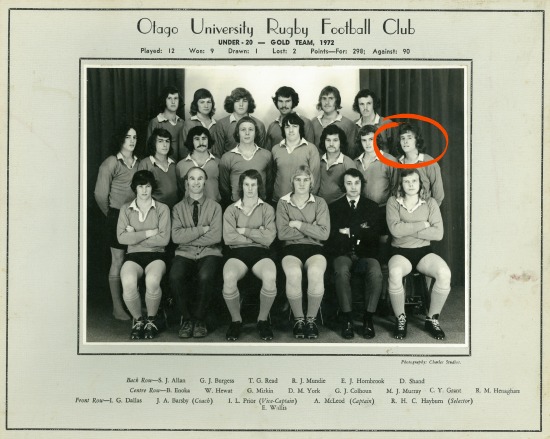
Mark:
Whatever you are asked to do, do it. And do it 100% . Go the extra mile. Add value. I realise these are cliches but they are for a very good reason. They are true.
With energy and enthusiasm you will always be employable.
Make a pact with yourself to learn everyday, which means staying open to the opportunities you are given.
What are your top 3 tips for young lawyers?
Mark:
Being early creates positive energy, whereas being late saps it.
- Always be courteous to everyone, treat people with kindness. That has a great ongoing positive impact for everyone, including oneself.
- Be early, always. Being early gives you the room to observe carefully what’s happening around you. It creates trust. People will know you as reliable, disciplined, and respectful of others. Being early creates positive energy, whereas being late saps it.
- Be known by the quality of your work, and do not be afraid to ask for feedback about it. If you have got something wrong, acknowledge and apologise for it straightaway. Then, if you can, fix it.
What are your survival tips for dealing effectively with stress at varying stages throughout a career in law?
As a young person?
Mark:
Have people around you. Put support teams in place to protect yourself and others. Be aware enough to know you need to have checks and balances in your life.
Mid-career?
Mark:
Be scrupulously honest with oneself. Keeping fresh is vital. Leave space for development and know your own weaknesses.
How do you balance demands as the result of being successful?
Mark:
Keep a diary, or get someone to do that for you AND accept what they say as they have your best interests at heart. I am very grateful to my executive assistant, Karen Warrington, who not only organises everything for me, but also ensures demands are balanced.
Legal issues
What do you think are the top current legal issues, and why?
Mark:
… people can not afford to go to court for answers
Access to legal process is too expensive with the result that too many people can not afford the fees. We have priced ourselves beyond their means! If we care, then we need to diversify the ways we have of delivering justice. An online system could be an answer
I feel we need to be realistic and really look at what is happening. We have gaps in the development of our law because people can not afford to go to court for answers, and those gaps are growing larger.
Alongside that the understandable rise of self-representation has its challenges too. Delays are inevitable.
Do you have any concerns about the current legal system?
Mark:
The need to be responsive and available and, that as a profession we are less and less accessible is a both a major challenge, and a concern to me.
We need more interaction with each other, not less.
I feel we used to be more united as a profession across all branches. We were inclusive. For instance everybody went to national law conferences. That doesn’t happen in the same way any more because we’ve formed different associations according to specialty. It’s a great big loss. We need more interaction with each other, not less. Judges need to get together with lawyers of all sorts. It would create better understanding on both sides.
It seems for some that becoming a specialist emphasises difference and creates a barrier – a “them” v “us” demarcation . Specializing has become something to hide behind – something to feel more, or less superior about.
I don’t think law should be siloed, fenced off and isolated. We need to speak the same language, to share experiences. It appears as if we’ve almost created different professions out of our need to set ourselves up, and apart. We are part of, and represent, a larger community and should never forget that. Public forums, and hearing the voice of the people is crucial to keep us honest and healthy.
Fellowship, meeting points, unity of purpose and service is what is required.
We need to find a way to keep in touch with each other, to keep our humanity.
Our splintered or fragmented profession makes it very difficult for our clients. We need to find a way to keep in touch with each other, to keep our humanity. Talking passed or over the top of each other is a sure fire way of alienating each other entirely. We belittle each other and trivialize law by allowing it to become increasingly self-referenced.
Looking ahead, what will be the top legal issues?
Mark:
The top legal issues are what they always have been – regardless of the age we live in.
These are developing the willingness to finding mutual meeting points, understanding we need to work with difference respectfully and honestly, understanding that everything is always in a state of evolution (for example new technologies create new issues for the law), and developing the strength, hope and tenacity to keep on, keeping on. That, and enjoying the challenge of what we are doing!

Who would you like to see interviewed?
You are welcome to forward the names of people whom you think fit the title legal luminary. Please send your suggestions through the response form below. We look forward to hearing from you.
